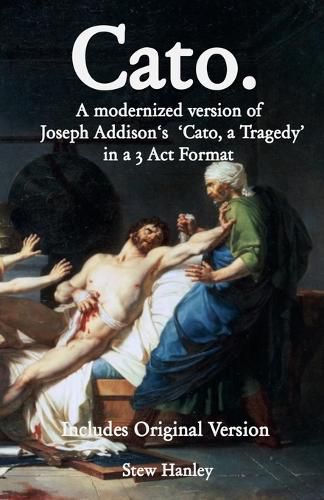Readings Newsletter
Become a Readings Member to make your shopping experience even easier.
Sign in or sign up for free!
You’re not far away from qualifying for FREE standard shipping within Australia
You’ve qualified for FREE standard shipping within Australia
The cart is loading…






This title is printed to order. This book may have been self-published. If so, we cannot guarantee the quality of the content. In the main most books will have gone through the editing process however some may not. We therefore suggest that you be aware of this before ordering this book. If in doubt check either the author or publisher’s details as we are unable to accept any returns unless they are faulty. Please contact us if you have any questions.
The action of the play involves the forces of Cato at Utica, located in the kingdom of Numidia (current day Tunisia/Algeria region of Northern Africa). Cato, a Roman Statesman and follower of the Stoic philosophy, was on the losing side of a civil war against Julius Caesar. Cato sees Caesar as an enemy of the Roman Republic's history of liberty, virtue, and other great traditions; a cruel dictator in short. After the war, Cato and Scipio, a like-minded Roman general, move their forces to Numidia; Cato to Utica and Scipio to Thapsus, a couple days travel away.
Julius Caesar, along with his vast army, have now come to Northern Africa looking for vengeance. Caesar has already defeated Scipio and is advancing towards Cato's position. There Cato awaits his arrival, for a battle that Cato is most certainly going to lose. Cato has to decide - fight to the end? surrender? take his own life and save his family and friends?
Through these events the play deals with larger issues like liberty versus tyranny, and virtue versus corruption. Cato must decide to stand for what he believes in the face of death.
Cato is without much hope, but not alone. He does have Juba, the prince of Numidia and Lucius, a senatorial ally by his side. However, Sempronius, another senator, and Syphax, general of the Numidians, are secretly conspiring against Cato, hoping to draw off the Numidian army from supporting him. Also with Cato are his sons, Portius and Marcus, and daughter, Marcia.
There are a number of love elements to the story. Portius and Marcus, are in love with Lucia, the daughter of Lucius. Juba loves Cato's daughter Marcia, who is also loved by Sempronius. They are all eager to express their love, but given the gravity of the situation they are in, none seem willing to indulge. It is a challenging situation for even a rigid, Stoic as Cato.
$9.00 standard shipping within Australia
FREE standard shipping within Australia for orders over $100.00
Express & International shipping calculated at checkout
This title is printed to order. This book may have been self-published. If so, we cannot guarantee the quality of the content. In the main most books will have gone through the editing process however some may not. We therefore suggest that you be aware of this before ordering this book. If in doubt check either the author or publisher’s details as we are unable to accept any returns unless they are faulty. Please contact us if you have any questions.
The action of the play involves the forces of Cato at Utica, located in the kingdom of Numidia (current day Tunisia/Algeria region of Northern Africa). Cato, a Roman Statesman and follower of the Stoic philosophy, was on the losing side of a civil war against Julius Caesar. Cato sees Caesar as an enemy of the Roman Republic's history of liberty, virtue, and other great traditions; a cruel dictator in short. After the war, Cato and Scipio, a like-minded Roman general, move their forces to Numidia; Cato to Utica and Scipio to Thapsus, a couple days travel away.
Julius Caesar, along with his vast army, have now come to Northern Africa looking for vengeance. Caesar has already defeated Scipio and is advancing towards Cato's position. There Cato awaits his arrival, for a battle that Cato is most certainly going to lose. Cato has to decide - fight to the end? surrender? take his own life and save his family and friends?
Through these events the play deals with larger issues like liberty versus tyranny, and virtue versus corruption. Cato must decide to stand for what he believes in the face of death.
Cato is without much hope, but not alone. He does have Juba, the prince of Numidia and Lucius, a senatorial ally by his side. However, Sempronius, another senator, and Syphax, general of the Numidians, are secretly conspiring against Cato, hoping to draw off the Numidian army from supporting him. Also with Cato are his sons, Portius and Marcus, and daughter, Marcia.
There are a number of love elements to the story. Portius and Marcus, are in love with Lucia, the daughter of Lucius. Juba loves Cato's daughter Marcia, who is also loved by Sempronius. They are all eager to express their love, but given the gravity of the situation they are in, none seem willing to indulge. It is a challenging situation for even a rigid, Stoic as Cato.